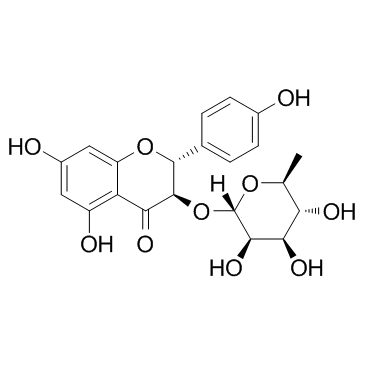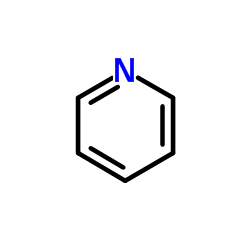| Description |
Engeletin is a flavanonol glycoside isolated from hymenaea martiana, inhibits NF-κB signaling-pathway activation, and possesses anti-inflammatory, analgesic, diuresis, detumescence, and antibiosis effects.
|
| Related Catalog |
|
| Target |
NF-κB
|
| In Vitro |
Engeletin is a flavanonol glycoside isolated from hymenaea martiana, inhibits NF-κB signaling-pathway activation[1].
|
| In Vivo |
Engeletin (25, 50, 100 mg/kg, i.p.) markedly reduces LPS-increased myeloperoxidase activity in mice, activates NF-κB-pathway activation, decreases the production of inflammatory mediators (iNOS and COX-2), and suppresses the expression of TLR4-signaling downstream molecules such as MyD88, IRAK1, TRAF6, and TAK1 proteins[1].
|
| Animal Admin |
Mice[1] The mice are classified at random into the following six groups of 10 mice each to cause the endometritis model: blank group, LPS group, Engeletin (25, 50, and 100 mg/kg) + LPS groups, and Engeletin (100 mg/kg) group. Engeletin is solubilized by heated normal saline to give the final concentrations of 25, 50, and 100 mg/kg. Briefly, each uterus is infused with 50 μL of LPS (1 mg/mL) to induce endometritis. At 24 h after the instillation, Engeletin groups receive an intraperitoneal injection of diverse Engeletin concentrations (25, 50, and 100 mg/kg) three times (once every 6 h). The Engeletin group is given an intraperitoneal injection of Engeletin (100 mg/kg). The blank group receive the normal saline. Afterward, the mice are killed by CO2 inhalation. Uterus tissues are harvested and kept in −80°C[1].
|
| References |
[1]. Wu H, et al. Engeletin Alleviates Lipopolysaccharide-Induced Endometritis in Mice by Inhibiting TLR4-mediated NF-κB Activation. J Agric Food Chem. 2016 Aug 10;64(31):6171-8.
|

 CAS#:110-86-1
CAS#:110-86-1 CAS#:7732-18-5
CAS#:7732-18-5
